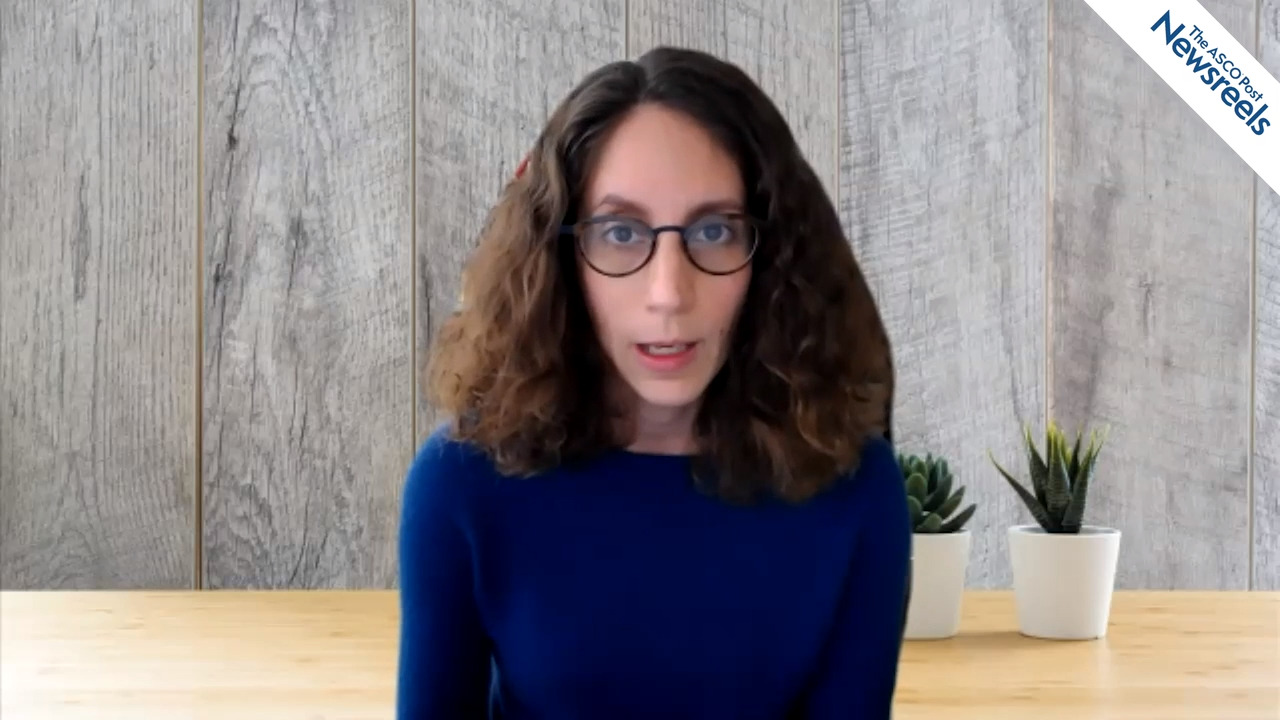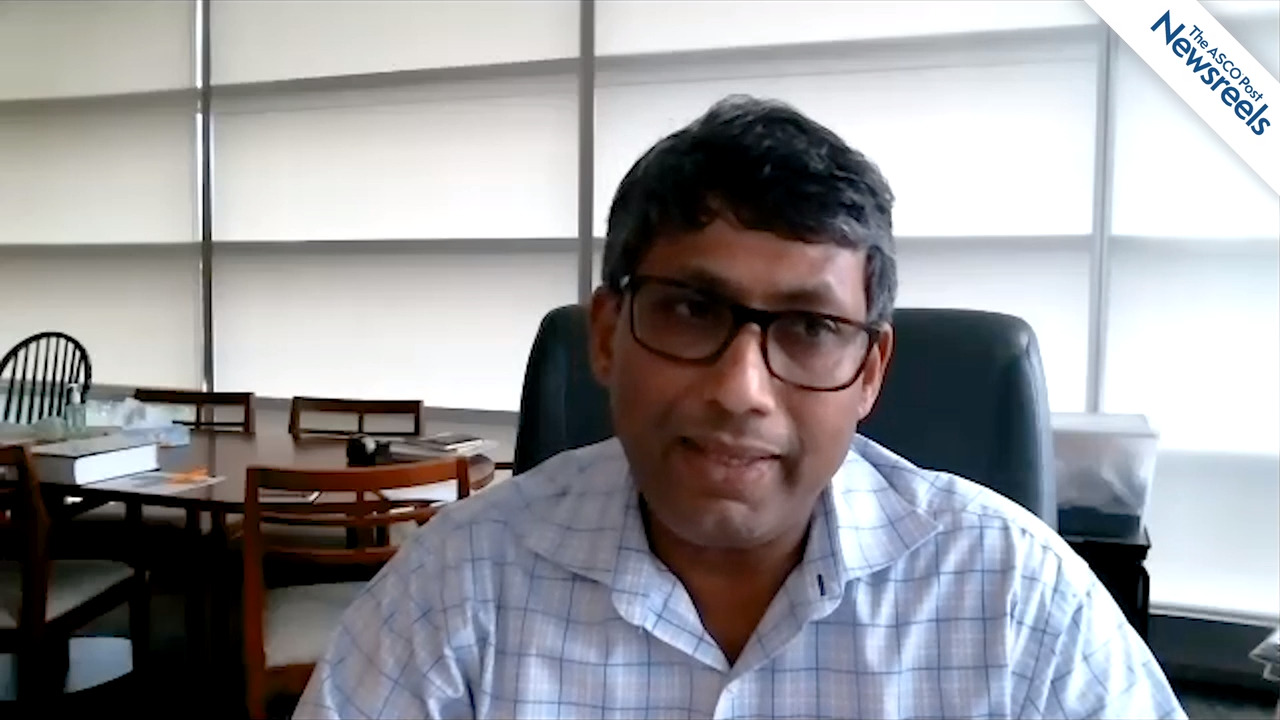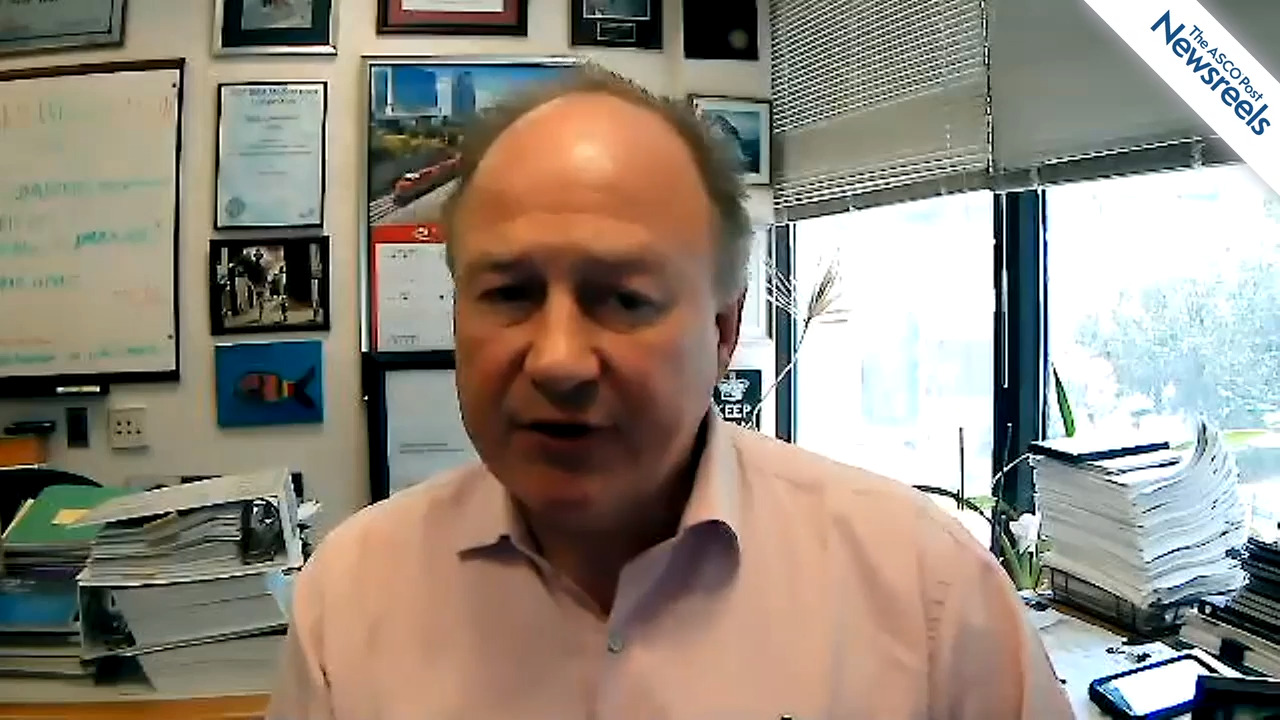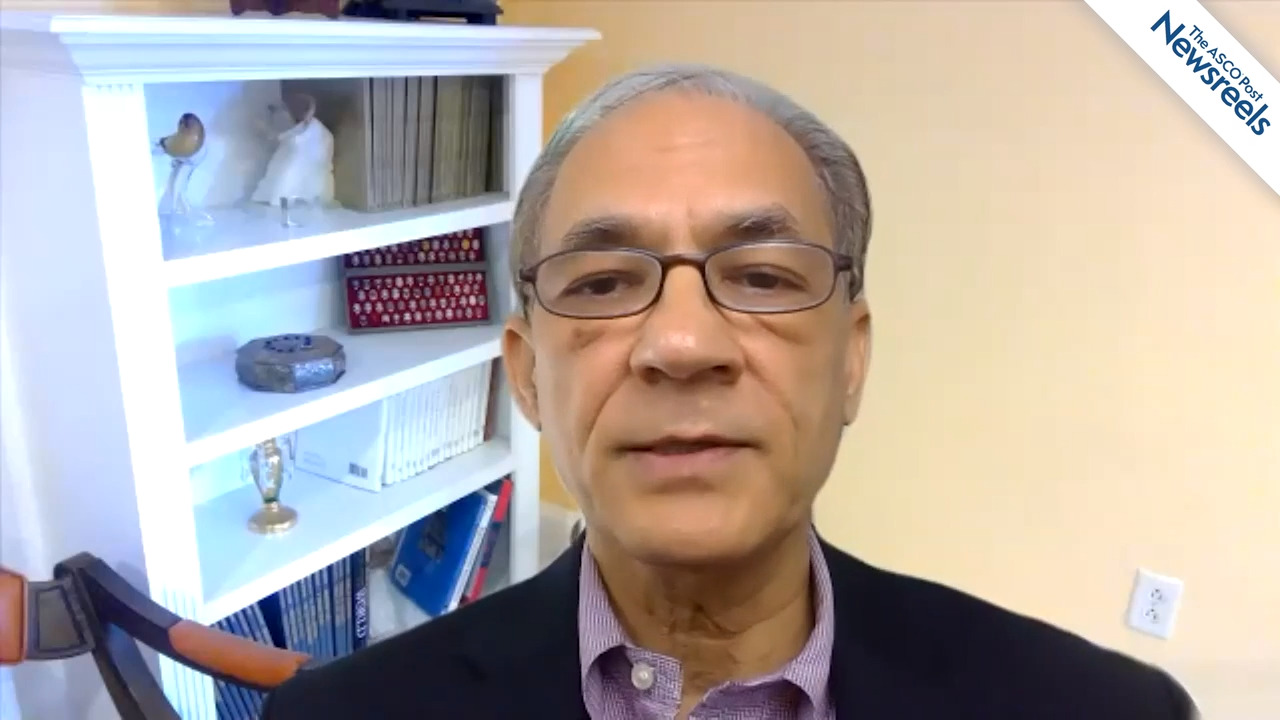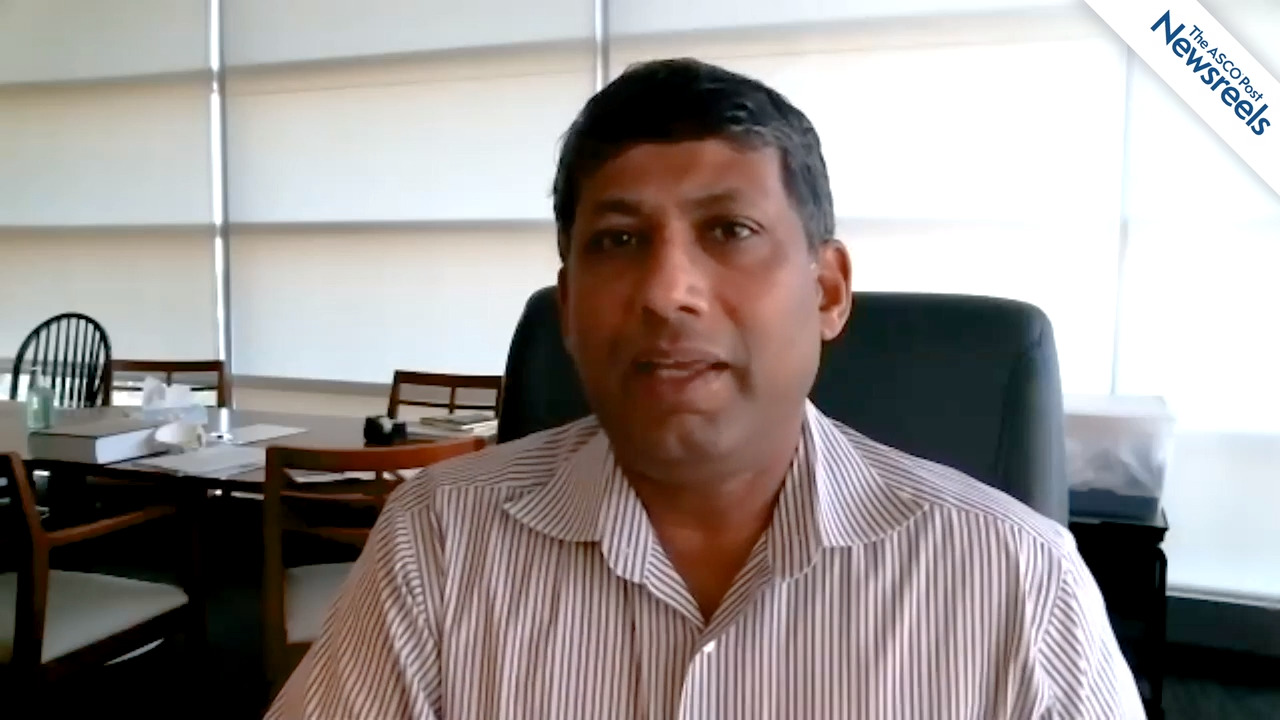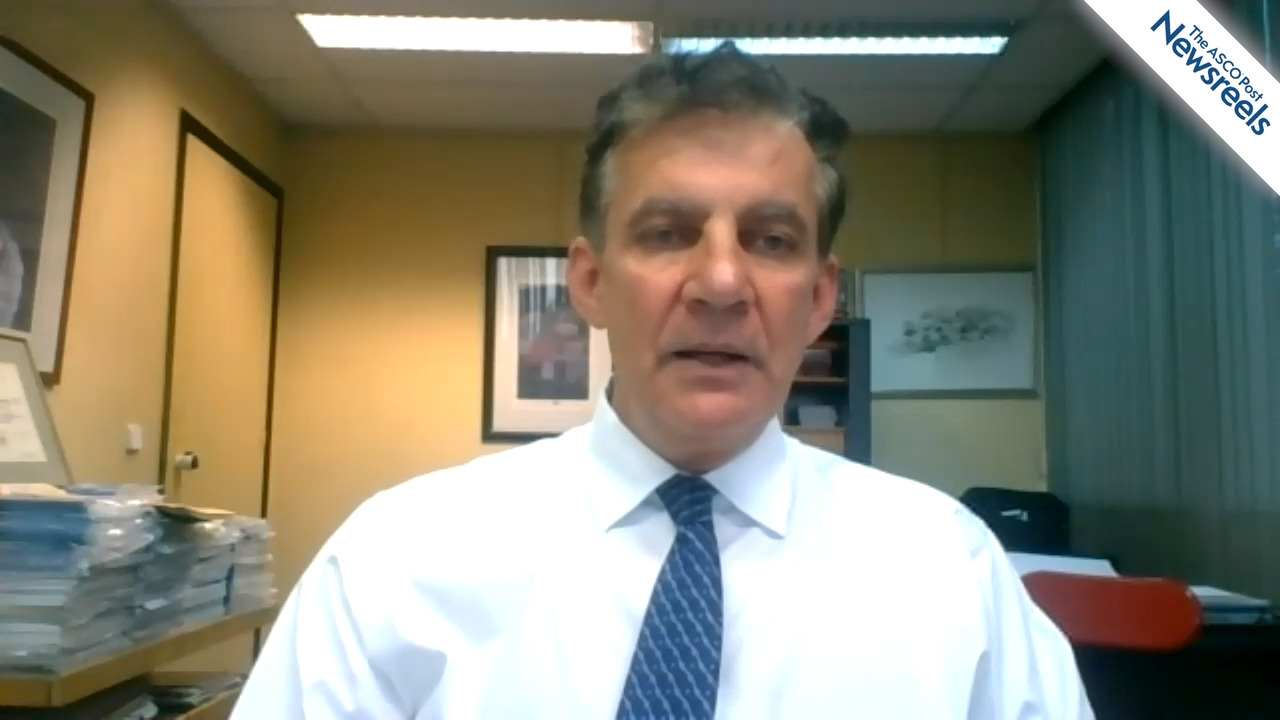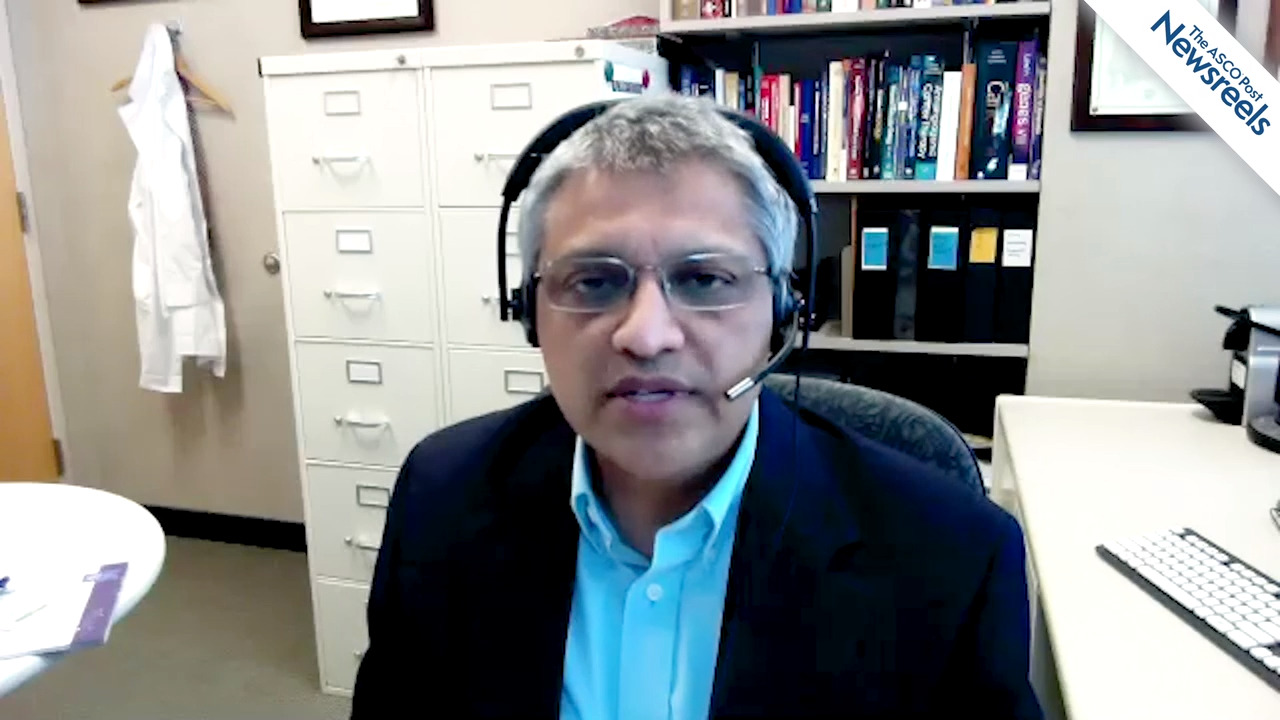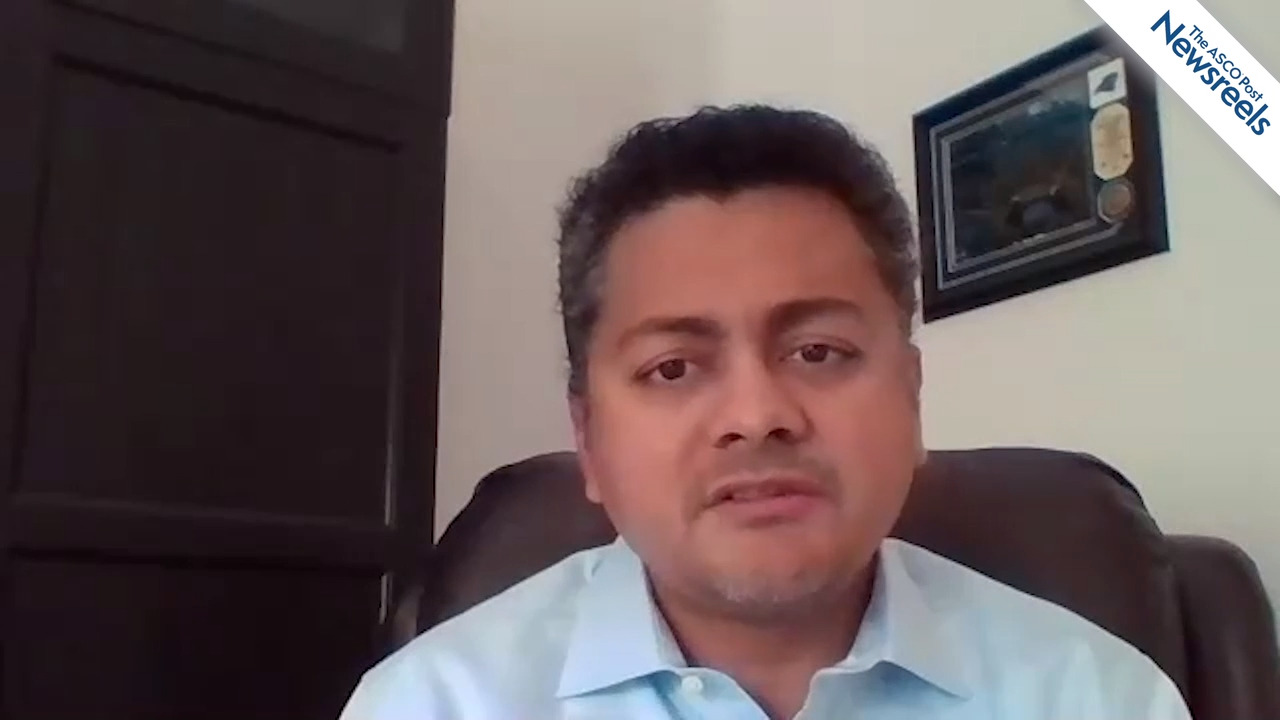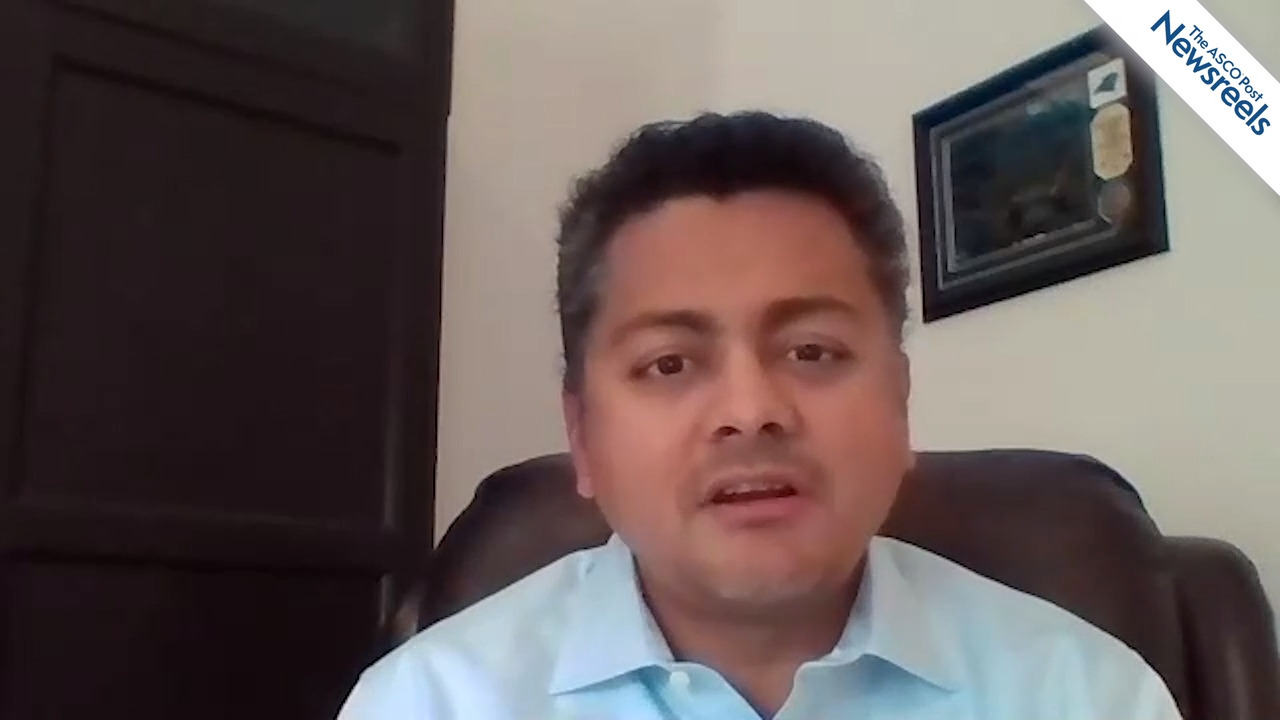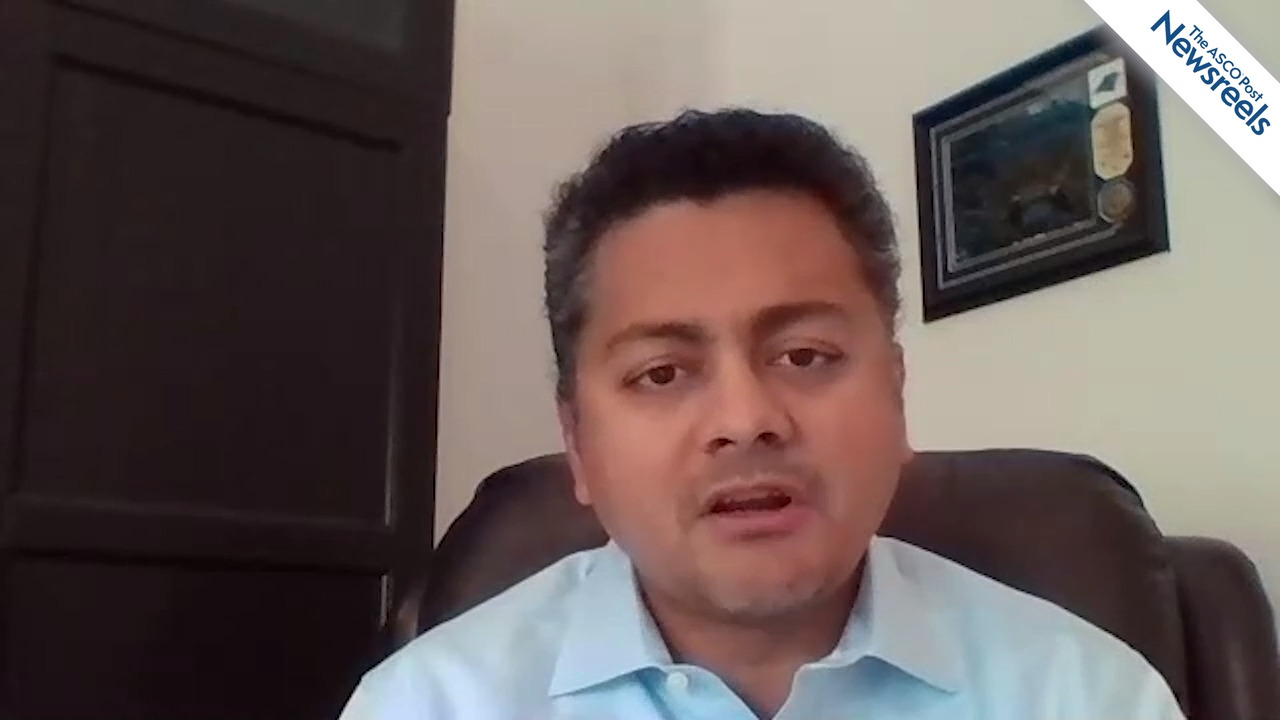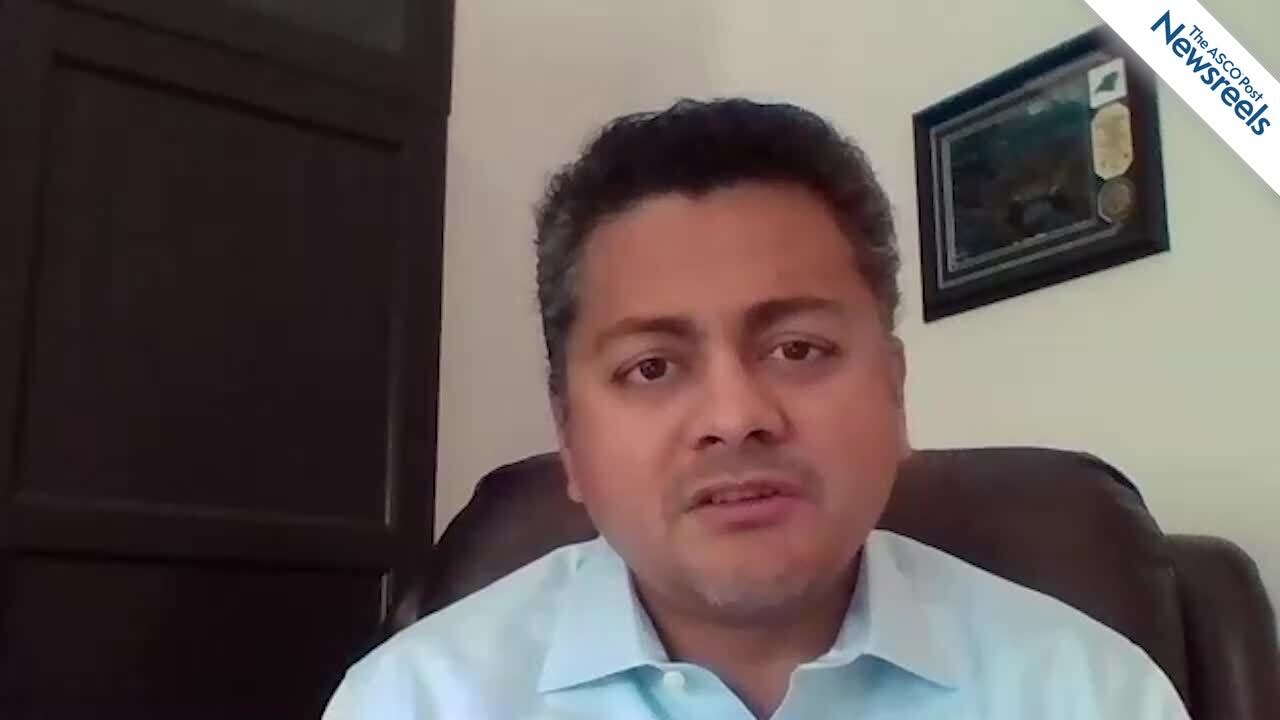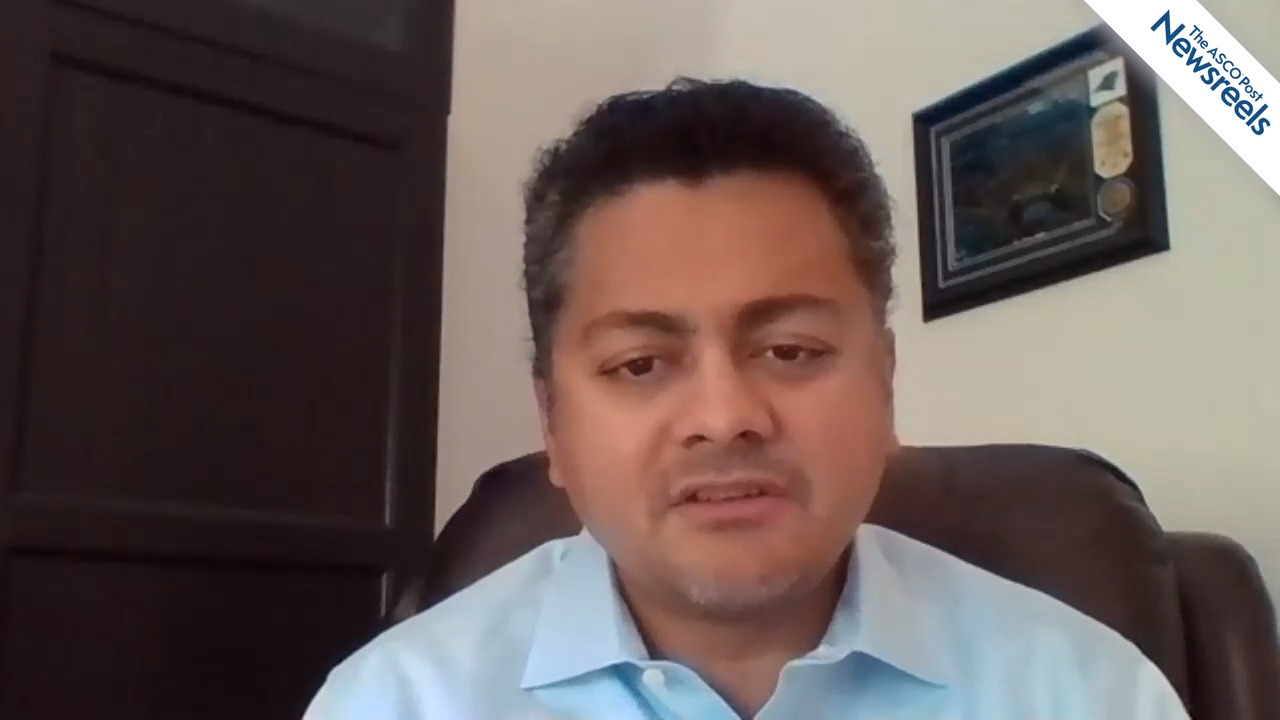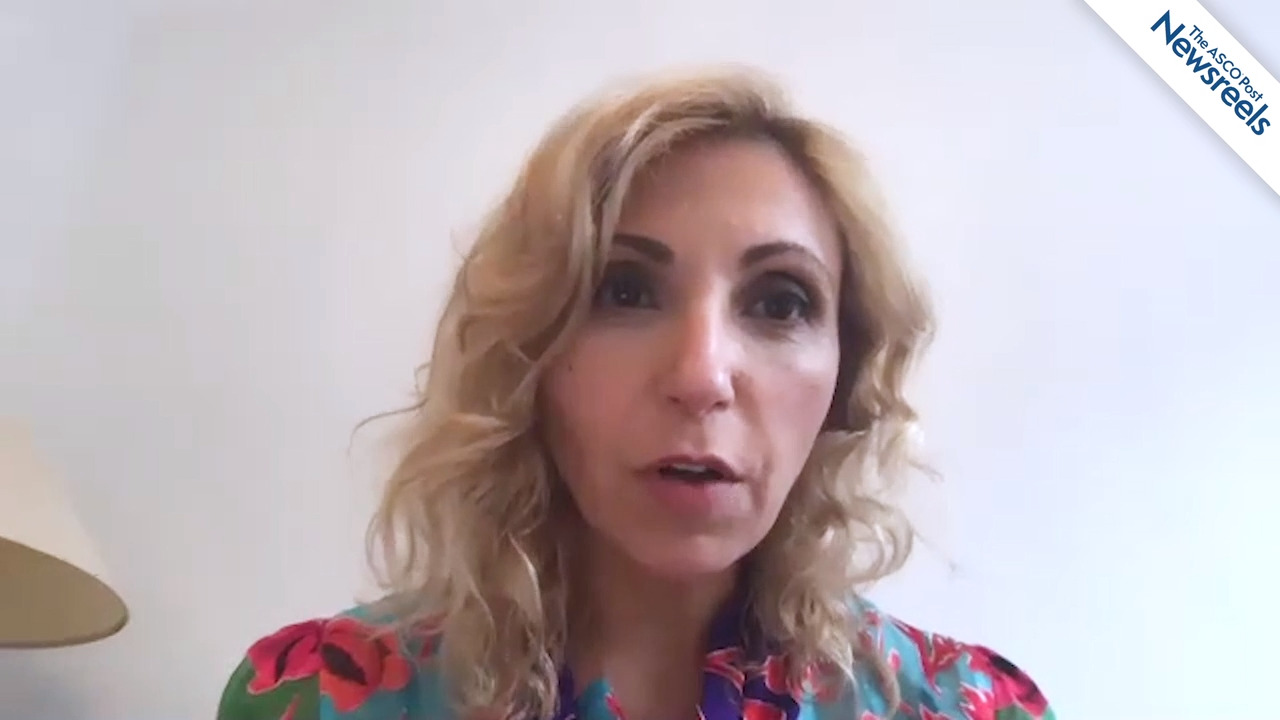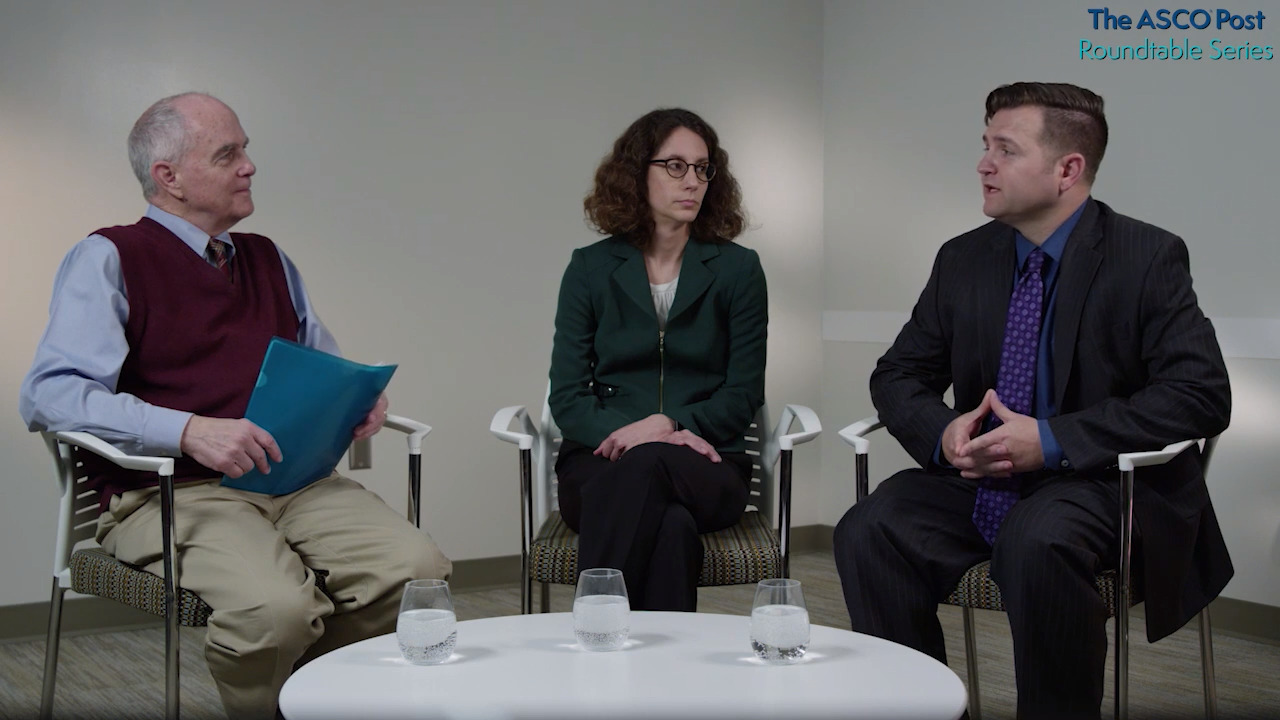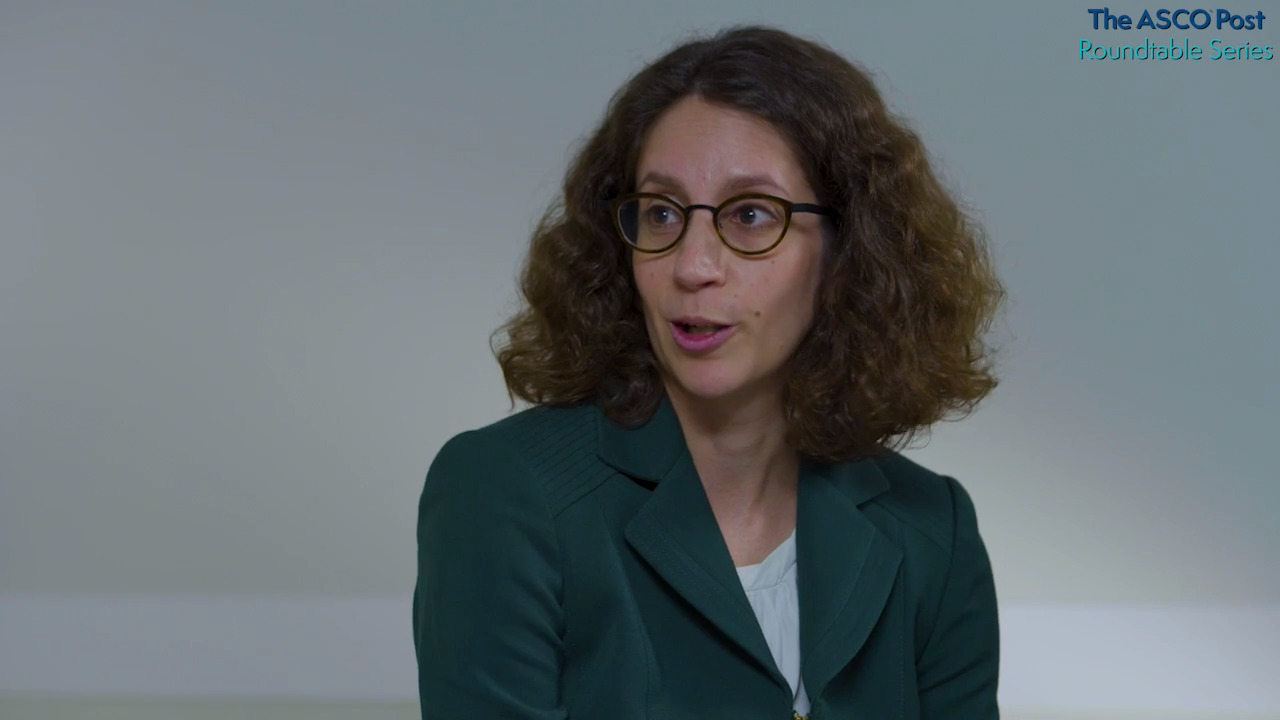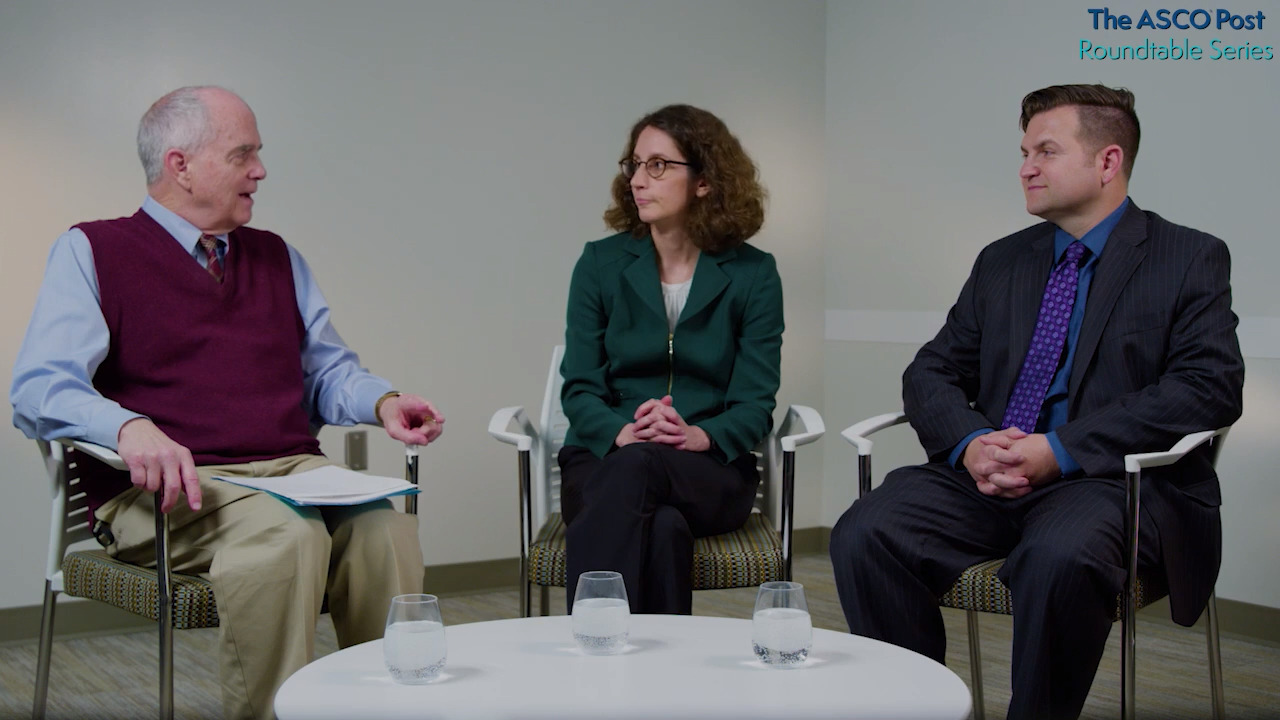Prolonged Overall Survival With Autologous-Allogeneic vs Tandem Autologous Transplant in Newly Diagnosed Myeloma
In a pooled analysis reported in Bone Marrow Transplantation,1 Luciano J. Costa, MD, PhD, of the University of Alabama at Birmingham, and colleagues found that autologous hematopoietic cell transplantation followed by reduced-intensity conditioning allogeneic transplantation (auto-allo) was...
Expert Point of View: Suzanne Lentzsch, MD, PhD, and Joshua Richter, MD
Two myeloma specialists weighed in on the disappointing findings of SWOG S1211: Suzanne Lentzsch, MD, PhD, Professor of Medicine at Columbia University and Director of the Multiple Myeloma and Amyloidosis Service, and Joshua Richter, MD, Assistant Professor of Medicine, Icahn School of Medicine at...
Elotuzumab Fails to Add Benefit in Newly Diagnosed High-Risk Myeloma
The addition of elotuzumab to a standard three-drug induction regimen did not improve outcomes in patients with high-risk multiple myeloma enrolled in the randomized phase II SWOG S1211 trial, according to findings reported during the ASCO20 Virtual Scientific Program by Saad Zafar Usmani, MD,...
Expert Point of View: Philip McCarthy, MD
Philip McCarthy, MD, Professor of Oncology and Internal Medicine and Director of the Transplant and Cellular Therapy Center at Roswell Park Comprehensive Cancer Center, Buffalo, New York, found the results of the DREAMM-6 study to be “exciting and promising.” He commented: “The overall response...
Responses Achieved With Belantamab Mafodotin in Relapsed or Refractory Myeloma
The antibody-drug conjugate belantamab mafodotin yielded responses as a single agent and in combination with bortezomib and dexamethasone in the treatment of relapsed or refractory multiple myeloma, according to two reports from the DREAMM team at the ASCO20 Virtual Scientific Program.1,2 In the...
Daratumumab and Hyaluronidase-fihj for Multiple Myeloma
On May 1, 2020, the combination of daratumumab and hyaluronidase-fihj was approved for adult patients with newly diagnosed or relapsed/refractory multiple myeloma. This new product allows for subcutaneous (SC) dosing of daratumumab.1,2 Daratumumab and hyaluronidase-fihj is for SC use only. The...
Phase III BOSTON Study Finds Selinexor Improves Outcomes in Myeloma
When added to bortezomib and dexamethasone in patients with multiple myeloma, selinexor significantly improved progression-free survival and response rates, with a lower incidence of peripheral neuropathy, compared with bortezomib/dexamethasone alone, according to results from the global phase III...
Expert Point of View: Philip McCarthy, MD
Philip McCarthy, MD, Professor of Oncology and Internal Medicine and Director of the Transplant and Cellular Therapy Center at Roswell Park Comprehensive Cancer Center, Buffalo, New York, found the results of the DREAMM-6 study to be “exciting and promising.” He commented: “The overall response...
Belantamab Mafodotin Shows Activity in Relapsed or Refractory Myeloma
Treatment of relapsed or refractory multiple myeloma yielded responses with the antibody-drug conjugate belantamab mafodotin, both as a single agent and in combination with bortezomib and dexamethasone. Two reports from the DREAMM team expanded on these findings at the ASCO20 Virtual Scientific...
Expert Point of View: Jesús G. Berdeja, MD
The importance of first-line therapy in multiple myeloma is that the first therapy typically achieves the most impact, and subsequent lines of therapy tend to be less effective, explained ENDURANCE study discussant Jesús G. Berdeja, MD, Director of Myeloma Research at the Sarah Cannon Research...
Outcomes in Newly Diagnosed Multiple Myeloma Unimproved by Carfilzomib Triplet vs Standard Bortezomib-Based Regimen
No superior efficacy was shown with the combination of carfilzomib, lenalidomide, and dexamethasone (KRd) in newly treated patients with standard- and intermediate-risk multiple myeloma who are not slated for immediate autologous stem cell transplantation (ASCT), compared with the standard of care: ...
Conference Highlights From the ASCO20 Virtual Scientific Program
The global outbreak of the COVID-19 pandemic forced many cancer societies, including ASCO, to cancel their in-person meetings this year and instead present the latest advancements and new approaches in oncology care via a virtual platform. For the first time in its 56-year history, the ASCO Annual...
Sarah A. Holstein, MD, PhD, on Multiple Myeloma: Expert Perspective on Five Key ASCO20 Abstracts
Sarah A. Holstein, MD, PhD, of the University of Nebraska Medical Center, discusses top myeloma abstracts from the ASCO20 Virtual Scientific Program: the ENDURANCE trial on carfilzomib, lenalidomide, dexamethasone, and bortezomib; the STaMINA study on transplantation strategies; a first-in-human study on the novel CELMoD agent CC-92480 plus dexamethasone; the CARTITUDE-1 trial on CAR T-cell therapy; and a phase I study of teclistamab (Abstracts LBA3, 8506, 8500, 8505, and 100).
Adding Cyclophosphamide to Bortezomib/Dexamethasone in Patients With Multiple Myeloma and Acute Kidney Injury From Cast Nephropathy
In a French trial reported in the Journal of Clinical Oncology, Bridoux et al found adding cyclophosphamide to bortezomib/dexamethasone offered no benefit for renal recovery of patients with multiple myeloma and initial cast nephropathy not requiring dialysis. Study Details In the multicenter...
Parameswaran Hari, MD, on Multiple Myeloma: Expert Commentary on Four Key Abstracts
Parameswaran Hari, MD, of the Medical College of Wisconsin, discusses data from four trials and their clinical implications for the treatment of patients with multiple myeloma: the KarMMa and EVOLVE studies on CAR T cell therapies; SWOG-1211 on bortezomib, lenalidomide, and dexamthasone with/without elotuzumab for newly diagnosed, high-risk disease; and the GMMGCONCEPT trial on isatuximab, carfilzomib, lenalidomide, and dexamethasone in front-line treatment (Abstracts 8503, 8504, 8507, 8508).
Paul G. Richardson, MD, on Multiple Myeloma: First-in-Human Study of the Novel Agent CC-92480
Paul G. Richardson, MD, of Dana-Farber Cancer Institute, discusses early results on a cereblon E3 ligase modulator agent combined with dexamethasone in patients with relapsed or refractory multiple myeloma, with an overall response rate of 48%. The study is ongoing to further optimize dose and schedule (Abstract 8500).
Nikhil C. Munshi, MD, on Multiple Myeloma: Idecabtagene Vicleucel in Patients With Relapsed or Refractory Disease
Nikhil C. Munshi, MD, of Dana-Farber Cancer Institute, discusses initial results from the KarMMa tria, showing that idecabtagene vicleucel, a B-cell maturation antigen-targeted CAR T-cell therapy, demonstrated deep and durable responses in patients with heavily pretreated relapsed or refractory multiple myeloma. Efficacy and safety data support a favorable clinical benefit-risk profile across the target dose range (Abstract 8503).
Parameswaran Hari, MD, on Multiple Myeloma: Post-Autologous Hematopoietic Cell Transplantation Strategies in Upfront Treatment
Parameswaran Hari, MD, of the Medical College of Wisconsin, discusses phase III data from a 6-year follow-up of the STaMINA trial, which compared progression-free survival among 758 patients with high-risk multiple myeloma who received a second autologous transplant and lenalidomide maintenance; consolidation with lenalidomide, bortezomib, and dexamethasone followed by lenalidomide maintenance; or lenalidomide maintenance alone (Abstract 8506).
Expert Point of View: Jesús G. Berdeja, MD
The importance of first-line therapy in multiple myeloma is that the first therapy typically achieves the most impact, and subsequent lines of therapy tend to be less effective, explained ENDURANCE study discussant Jesús G. Berdeja, MD, Director of Myeloma Research at the Sarah Cannon Research...
Carfilzomib Triplet Fails to Improve Outcomes vs Standard Bortezomib-Based Regimen in Newly Diagnosed Myeloma
For newly treated patients with standard- and intermediate-risk multiple myeloma who are not slated for immediate autologous stem cell transplantation (ASCT), the triplet regimen of carfilzomib/lenalidomide/dexamethasone (KRd) failed to improve progression-free survival vs the current...
Addition of CD38-Directed Antibody Isatuximab to Multiple Myeloma Armamentarium
The treatment approaches to multiple myeloma have significantly changed over the past decade with the introduction of many new active agents. Among them, the monoclonal antibodies have been one of the most exciting advances in myeloma, complementing their success in other hematologic cancers. In...
Genomic Characteristics of Smoldering Multiple Myeloma and Risk of Progression
In a study reported in the Journal of Clinical Oncology, Mark Bustoros, MD, and colleagues identified genomic features of smoldering multiple myeloma associated with a higher risk of progression to multiple myeloma and found that alterations that drive disease progression are already present at the ...
Meletios A. Dimopoulos, MD, on Multiple Myeloma: Selinexor, Bortezomib, and Dexamethasone for Previously Treated Patients
Meletios A. Dimopoulos, MD, of the University of Athens, discusses phase III results from the BOSTON trial, which showed that once-weekly selinexor, bortezomib, and dexamethasone significantly improved progression-free survival and overall response rates compared with twice-weekly bortezomib and dexamethasone in patients previously treated for multiple myeloma (Abstract 8501).
Carfilzomib vs Bortezomib in Addition to Lenalidomide/Dexamethasone in Newly Diagnosed Multiple Myeloma
The combination of carfilzomib, lenalidomide, and dexamethasone (KRd) did not show superior efficacy in patients with newly diagnosed myeloma absent a high-risk disease prognosis, compared with the standard of care: bortezomib, lenalidomide, and dexamethasone (VRd). Data from a planned interim...
Shaji Kumar, MD, on Multiple Myeloma: Phase III Results on Carfilzomib, Lenalidomide, Bortezomib, and Dexamethasone
Shaji Kumar, MD, of the Mayo Clinic, discusses findings from the ENDURANCE trial, which showed bortezomib, lenalidomide, and dexamethasone should remain the standard of care in patients with newly diagnosed standard- or intermediate-risk multiple myeloma, for whom early autologous stem cell transplant is not intended (Abstract LBA3).
I Have Multiple Myeloma and Am Concerned About the Coronavirus
In hindsight, the symptoms I began experiencing in the fall of 2013—sudden excruciating back bone pain and severe fatigue—should have tipped me off that I had a serious disease, but 7 years ago, they were easy to explain away. The bone pain was similar to what I had experienced several years...
Highlights From ASH 2019 Included New Data in Leukemia, Lymphoma, Myeloma, and Myelodysplastic Syndromes
The 2019 American Society of Hematology (ASH) Annual Meeting & Exposition featured a cornucopia of sessions. It was impossible to attend all the lectures, symposia, oral presentations, poster presentations, and special events because many were concurrent. Below, we have selected some...
Saad Z. Usmani, MD: In My Experience Question 5
For community oncologists treating patients with multiple myeloma during the COVID-19 pandemic, what resources and clinical pearls would you suggest? Recorded April 24, 2020.
Outcomes With Autologous-Allogeneic vs Tandem Autologous Hematopoietic Cell Transplantation in Patients With Newly Diagnosed Multiple Myeloma
In a pooled analysis reported in the journal Bone Marrow Transplantation, Costa et al found that autologous followed by reduced-intensity conditioning allogeneic hematopoietic cell transplantation (auto-allo) was associated with longer overall survival compared with tandem autologous...
Saad Z. Usmani, MD: In My Experience Question 4
For patients with multiple myeloma who are currently on clinical trials, what are the most pressing issues as we fight COVID-19? Recorded April 24, 2020.
Saad Z. Usmani, MD: In My Experience Question 3
Because of the COVID-19 pandemic, has your management strategy changed for post-transplant consolidation and maintenance therapy in patients with multiple myeloma? Recorded April 24, 2020.
Saad Z. Usmani, MD: In My Experience Question 2
During the COVID-19 pandemic, do you suggest delaying upfront autologous transplant for patients with multiple myeloma? Recorded April 24, 2020.
Saad Z. Usmani, MD: In My Experience Question 1
As a result of COVID-19, has your decision model for front-line therapy changed for patients with multiple myeloma who are either transplant-eligible or ineligible? Recorded April 24, 2020.
FDA Approves Daratumumab and Hyaluronidase-fihj in Multiple Myeloma
On May 1, the U.S. Food and Drug Administration (FDA) approved daratumumab and hyaluronidase-fihj (Darzalex Faspro) for adult patients with newly diagnosed, relapsed, or refractory multiple myeloma. This new product allows for subcutaneous dosing of daratumumab. Daratumumab and hyaluronidase-fihj...
Managing Multiple Myeloma During the COVID-19 Pandemic
In dealing with coronavirus disease 2019 (COVID-19), some oncologists are modifying conventional treatment regimens to limit patients’ visits to infusion centers and providers’ offices. The ASCO Post asked C. Ola Landgren, MD, PhD, Chief of the Myeloma Service at Memorial Sloan Kettering Cancer...
Long-Term Outcomes With Triplet Induction and Risk-Adapted Maintenance Therapy for Newly Diagnosed Multiple Myeloma
As reported by Joseph et al in the Journal of Clinical Oncology, follow-up in a large cohort of patients with newly diagnosed multiple myeloma indicates good long-term outcomes with consecutive treatment with lenalidomide/bortezomib/dexamethasone (RVD) induction therapy and risk-adapted maintenance ...
Isatuximab-irfc for Previously Treated Multiple Myeloma
On March 2, 2020, the CD-38-directed cytolytic antibody isatuximab-irfc (Sarclisa) was approved for use in combination with pomalidomide and dexamethasone for adult patients with multiple myeloma who have received at least two prior therapies including lenalidomide and a proteasome inhibitor.1,2...
Actively Recruiting Clinical Trials Studying Multiple Myeloma
This Clinical Trials Resource Guide lists six actively recruiting clinical trials that focus on treating multiple myeloma. These studies, ranging from phase I to phase III, are evaluating the safety and efficacy of vaccines, cytotoxic T lymphocytes, and drug treatment regimens. Some studies center ...
Addition of Isatuximab to Pomalidomide and Dexamethasone in Relapsed and Refractory Multiple Myeloma
As reported in The Lancet by Michel Attal, MD, of the Institut Universitaire du Cancer Toulouse Oncopole, France, and colleagues, the phase III ICARIA-MM trial has shown that the addition of the CD38-targeted antibody isatuximab to pomalidomide and low-dose dexamethasone significantly improved...
Case Study: Patient With Multiple Myeloma Treated for COVID-19 With Tocilizumab
A case study of one patient with multiple myeloma diagnosed with COVID-19 in Wuhan, China, published by Zhang et al in Blood Advances examined the efficacy of the immunosuppressant tocilizumab as a treatment for this particular patient. The report also suggested that patients with hematologic...
Daratumumab for Relapsed or Refractory Multiple Myeloma: Subcutaneous vs Intravenous Dosing
Findings from the phase III COLUMBA trial have shown that subcutaneous daratumumab is not inferior to intravenous daratumumab in terms of efficacy and pharmacokinetics and had an improved safety profile in patients with relapsed or refractory multiple myeloma. These results were published by...
Irene M. Ghobrial, MD, on How COVID-19 is Changing the Conduct of Clinical Trials
Irene M. Ghobrial, MD, of Dana-Farber Cancer Institute, talks about PROMISE—her screening study for people at high-risk of developing precursor conditions of multiple myeloma—and how this and other trials have been altered in the wake of the pandemic, as well as what might be considered a silver lining to the crisis. Filmed March 30, 2020.
A Discussion About CAR T-Cell Therapy for Multiple Myeloma and Lymphoma
Dr. Armitage discusses the role of CAR T-cell therapy in the management of multiple myeloma and lymphoma in a conversation with his colleagues Dr. Holstein and Dr. Lunning.
A Case of Relapsed/Refractory Multiple Myeloma
Dr. Armitage presents a case and asks Dr. Holstein to comment about her approach to treatment. The patient is be a 59-year-old man who had presented with symptomatic myeloma with bone pain and he was feeling unwell. He had bone lesions on images. He was anemic. This all happened 2 years ago. He was treated with RVD for six cycles and then an auto-transplant, followed by lenalidomide maintenance. Now, 2 years later, the patient returned to report that he had started to not feel well. He was found to have a falling hemoglobin level and a bone marrow biopsy showed 50% plasma cells. Repeat bone imaging showed new lytic lesions. How would you treat this patient?
A Case of Smoldering Myeloma
In this episode, Dr. Armitage presents a case and asks Dr. Holstein to comment on her approach to treatment of this individual. The patient is a 65-year-old man who was referred because of a monoclonal protein found in his blood. The patient was asymptomatic. He had a normal exam. He had an IgG kappa protein of about 3.5 g. There was no protein in the urine and the bone marrow biopsy showed 17% clonal plasma cells. His renal function calcium, bone images were all normal. The patient had been told by another physician that no treatment was appropriate and he came to you wanting another opinion.
FDA Approves Isatuximab-irfc–Based Triplet Regimen for Patients With Relapsed or Refractory Multiple Myeloma
On March 2, the U.S. Food and Drug Administration (FDA) approved isatuximab-irfc (Sarclisa) in combination with pomalidomide and dexamethasone for the treatment of adult patients with multiple myeloma who have received at least two prior therapies, including lenalidomide and a proteasome inhibitor. ...
Redefining What It Means to Have Precursor Myeloma
Studies have shown that all patients diagnosed with multiple myeloma had a preceding asymptomatic expansion of clonal plasma cells, clinically recognized as monoclonal gammopathy of undetermined significance or smoldering multiple myeloma. According to C. Ola Landgren, MD, PhD, Professor of...
Expert Point of View: Suzanne Lentzsch, MD, PhD
Suzanne Lentzsch, MD, PhD, Professor of Medicine and Director of the Multiple Myeloma and Amyloidosis Service at Columbia University, offered her thoughts on venetoclax-based regimens, such as the one described by Dr. Kaufman. “Despite tremendous progress in the treatment of multiple myeloma, the...
Venetoclax Plus Dexamethasone Shows Activity in t(11;14) Multiple Myeloma
In a phase I/II study of patients with advanced multiple myeloma and t(11;14) translocations, the combination of venetoclax and dexamethasone showed strong, durable activity, even in patients refractory to daratumumab, study investigators reported at the 2019 American Society of Hematology (ASH)...
Highlights From ASH 2019 Included New Data in Leukemia, Lymphoma, and Multiple Myeloma
The ASH 2019 Annual Meeting & Exposition featured countless important sessions and lectures. It would be impossible to attend all the symposia, oral presentations, poster presentations, and special events. Below, we have selected some presentation highlights to supplement our coverage of the...
